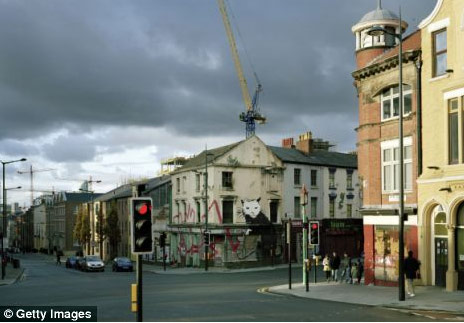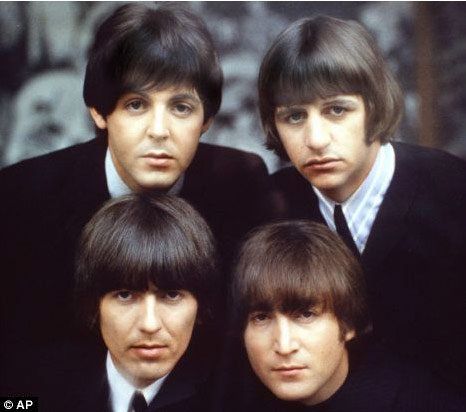Edwina
Currie: Isn't it time we Scousers admitted some home truths?
By Edwina Currie
Last updated
at 1:16 AM on 14th August 2008
Edwina Currie: 'You seek energy, creativity, cutting-edge employment?
Head for London, not Liverpool'
The policy
Exchange, said to be David Cameron's favourite think-tank, has really
set the cat among the pigeons with its latest report.
Northern cities such as Liverpool, Bradford and Sunderland are beyond
saving, it says.
The millions
spent on regeneration have been wasted; restrictions on building
down south should be lifted and people encouraged to move to 'economic
powerhouses' such as London, Oxford and Cambridge, otherwise they
risk being 'trapped' in places which have 'little prospect of offering
their residents the standard of living to which they aspire.'
Cue howls of protest, rather as one would expect.
David Cameron,
touring the North this week, has denounced the report as 'insane'.
Regeneration,
he declares, has been a key Conservative theme over the past three
years. Of course it has.
After all, David
is hunting votes beyond the Tory heartlands and is dangling the
prospect of yet more government handouts as bait.
But since there
hasn't been a Tory MP in Liverpool since I was a teenager, he probably
shouldn't bother. I reckon the report is uttering only home truths,
unpalatable though they may be to politicians of every hue.
If government efforts to help northern cities since the 1950s had
succeeded, then there would be no gap in living standards, or employment,
or educational achievement, or health - yet the gaps have persisted
and in many cases widened.
You hope to
live a long life? Try Hampshire, not Hull. You dream of a three-car
household? That's Surrey, not Sunderland.
You seek energy,
creativity, cutting-edge employment? Head for London, not Liverpool.
That's what
I did, 40 years ago, and I have never felt the urge to move back
to my home town of Liverpool.
I grew up in
Childwall, a district in the south-east of the city, with Mum and
Dad, and my brother Henry, in an ordinary semi.
My father had
a gentleman's tailoring business in the heart of the city in Williamson
Square, making uniforms for sea captains.
In 1994 we held
a reunion of my old school, the Liverpool Institute High School
for Girls, to celebrate the 150th anniversary of its foundation,
and I discovered that the entire sixth form of my day had migrated,
most of them down south; only one girl still lived in the 'Pool,
and she'd returned to live with her parents.

Liverpool
landscape: Standards of living have 'little prospect' of improving
Worst of all, the loony-Left city council under Derek Hatton had
closed our wonderful school, and the companion boys' school where
Beatles Paul McCartney and George Harrison had been pupils.
State grammar
schools with their cult of excellence didn't fit into the council's
'regeneration' plans, did they?
When I was
a kid, Liverpool had 800,000 residents and was still a world-renowned
seaport.
It was a rumbustious
place, with a fabulous music scene, majestic public buildings, international
business such as insurance and shipbuilding; we watched the Cunard
flagships setting off for New York and dreamed of sailing away ourselves
some day.
Escape, that's
what we had in mind. It was an extraordinarily prosperous place
- and the sky seemed to be the limit.
But by the time
I had my 'ticket to ride' in the form of a scholarship to Oxford,
the port had lost its reputation as the Atlantic shipping trade
died and endless strikes finished it off.
Meanwhile, Liverpool
itself was haemorrhaging a thousand people a week. Now, the city's
population is down to 439,000; a quarter of its residents are on
benefits, the highest proportion in the country, while on a Saturday
night Liverpool has the highest rate of emergency hospital admissions
for alcohol-related injuries in England.

The Beatles:
Liverpool's most famous sons
I still go back occasionally. There's definitely still a lot to
love about Liverpool.
Scousers are incredibly warm-hearted, funny and generous. And they
certainly know how to have fun.
But it isn't
long before I get a sinking feeling, and remember why I left my
hometown.
Like emerging
from Lime Street Station in February - at what was the beginning
of Liverpool's year as the European Capital of Culture - to find
pavements dug up and underpasses closed. Hardly a centre of cultural
excellence.
'They'll be
ready for it this time next year,' I muttered.
Or when international
golf came to Lytham St Annes, up the road. I asked my taxi driver
about it: 'Bloody Americans,' he complained, hardly the attitude
to welcome high-spending foreign visitors.
In December
2006 I went to a Christmas dinner at the Adelphi hotel, once the
Claridge's of Liverpool, only to find a notice in the bedroom saying,
'All electrical items removed from this room to be paid for' as
if it were a cheap hostel where all its guests were thieves.
Hardly welcoming
surroundings for the traveller searching out the legendary Liverpool.
My heart goes
out to the local people. They've been conned by successive governments,
both Tory and Labour, and by the Liberal Democrats who have run
the council more recently.
Government money
won't turn things round. Only your own initiative will do that.
And what the report says is so true it shouldn't need restating:
that if a city has lost its raison d'être, whatever it was
that brought it into existence in the first place, then shedloads
of taxpayers' largesse won't turn back the clock.

TV's The
Liver Birds: A celebration of Scouse humour
Far better, and cheaper, if workers go to where the jobs are, rather
than trying to blackmail or subsidise business to move to where
it does not want to go.
In fact, that's what many individuals have been doing for decades.
Like me, they look at the lack of opportunities, and they vote with
their feet.
The problem
is, government interference makes things worse. Local politicians
become adept at holding out their hands, palm upwards; the skills
thus valued are how to fill in forms and how to spin a convincing
tale of woe and continuing need, instead of figuring out what talents
their residents have, or need to develop, to compete in the modern
world.
Those with imagination
or ambition or a determination to do things for themselves don't
fit - take Liverpool's most famous living son, Sir Paul McCartney.
His success came to him only in London - and there he remains. I
am not talking through my hat; I've been through this before, when
I was an MP.
As the pits
closed down in my South Derbyshire constituency, unemployment began
to rise.
We had lived
on state subsidies for decades and things had to change. But the
locals were skilled, hard-working, and open to ideas.
They were also
adaptable, and willing to take on whatever challenges were flung
at them. They did not believe in going on strike and were determined
not to live on handouts.
Along came car
manufacturer Toyota, and hey presto! The new factory meant Derbyshire
was making cars, and the area gleams with a new prosperity.
Population
has risen so much that there'll be an additional parliamentary seat
come the next election. And none of it was done with public money,
not a penny.
If I were in
charge in Liverpool today I would be reading this report with interest.
I'd be making inquiries: what do outsiders come to Liverpool for?
What do they like when they arrive? How can we persuade them to
stay, and spend money here?
I'd be asking
the two Liverpool universities to see what happens to their graduates,
and what might persuade them to seek employment in the city.
I'd not be squeamish about asking what they hate, and taking action
about it: the crime, the dirt, the ignorance, the shortage of decent
places to stay and to eat, the dereliction on every side.
Plenty of cities
set examples of revival through their own efforts, from Manchester
to New York. It can be done.
And as someone
who still loves Liverpool, my message to my fellow Scousers would
be: get on and do the same.
Previous Page
Click
here to print this page
|





